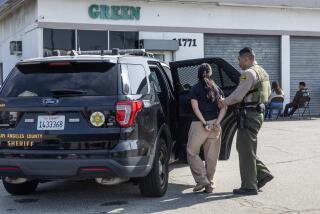DRUGS: Schools Consider Locker Sniff Tests by Dogs : Student Lockers May Face Sniff Test by Canine Police
- Share via
SIMI VALLEY — Students who stash drugs in lockers at junior high or high school campuses may be sniffed out by police dogs if school officials approve a proposed canine training program in cooperation with the Police Department.
The program, which won unanimous support during a discussion Tuesday night from Simi Valley Unified School District trustees, would begin in the spring if it is approved in a board vote next month.
Under the proposal, police dogs would be brought on campus periodically and without prior notice to the students, who would be in class during the inspections.
Teams of handlers and dogs would go from locker to locker, marking with stickers any lockers the dogs identified as containing drugs. But because the program is designed only as a training exercise for police dogs, the police would then leave the campus and not be involved with opening and searching the marked lockers. Enforcement and discipline would be up to school administrators.
Supt. Mary Beth Wolford proposed the idea as a means of keeping the schools drug-free at no charge to the district.
“We do not want drugs brought to school,” Wolford said. “They should not be in lockers. I think the students will be amazed at the ability of these dogs to identify substances.”
Although similar training exercises have been conducted at Ventura schools, an attorney for the American Civil Liberties Union of Northern California said the program could violate students’ rights to privacy.
“The idea of bringing in dogs to sniff at every locker looking for drugs is demeaning to the students,” said Ann Brick, a staff ACLU attorney in San Francisco. “It sends them the wrong message: ‘We’re going to assume you’re all guilty until proven innocent by passing this dog sniff test.’ ”
Brick said case law dictates that lockers cannot be searched without reasonable suspicion that students have committed an unlawful act, that their belongings contain evidence of a criminal activity or that students have violated school rules. She said the issue would have to be tested in court.
“It’s all going to turn on whether or not a court decides bringing in the dogs to sniff is or is not a search,” she said. She said the ACLU knows about instances in which school districts bring privately owned narcotic-sniffing dogs onto school campuses, but she is unaware of other school districts in the state using police dogs on campus, even for a training mission.
Several students who spoke before the board on Tuesday lambasted the district for considering a proposal that they said would turn their already fenced campus into a prison or detention facility.
Ogie Hudson, a senior at Simi Valley High and president of the drama club, called the program pointless, because students who want to use drugs will do so regardless of whether their lockers are searched. For the rest of the students who are not users, the idea is insulting, he said.
“When these dogs come on campus, every student is a suspect,” he said. “It creates a prison atmosphere. And it violates our privacy.”
Tina Giles, a Simi High junior, agreed. “School is a place of learning, and with dogs on campus, I don’t feel that. I feel afraid,” she said.
Sean Carl, a sophomore at Sequoia Junior High, compared the idea to George Orwell’s writings on totalitarianism.
“Bringing narcotics dogs to school resembles this, or a fascist action,” he said.
But Joey Reid, student body president at Simi High and student member on the board, said the searches would be a deterrent for students to keep drugs off campus. And the result might be that they would use fewer drugs and stay in school.
“If it helps just one kid graduate, I’m for it,” he said.
Because the Police Department is involved, Brick said the school district should be held to a higher standard in determining whether student privacy is being violated. In addition, she said, school children could be needlessly embarrassed if the dog is wrong about what’s in the locker.
But school and police officials said that students’ lockers are not their private property and that the police are not involved other than to handle the animals.
“This is a training exercise for canine teams,” said Simi Valley Police Lt. Don Austin, who made the presentation to the board Tuesday. “We are not there in an enforcing capacity.”
Ventura High School Principal Henry Robertson, who has allowed dogs to sniff lockers in his school twice, said the program benefits the schools and the police departments. He said he received no complaints from students or parents on either occasion.
“The students know these lockers are not their own personal property and that we have the right to search them at any time if we have probable cause,” he said.
No drugs were found either time, but one locker was searched after a dog indicated it might contain drugs.
“We found a peanut butter sandwich,” Robertson said.
Brick said that kind of false positive result is further evidence that police dogs on campus may be inappropriate.
“The whole notion that an entire student body can be subjected to a sniff search is precisely the kind of thing the framers of the Constitution wanted to prevent when they wrote the Fourth Amendment,” she said.
More to Read
Sign up for Essential California
The most important California stories and recommendations in your inbox every morning.
You may occasionally receive promotional content from the Los Angeles Times.













